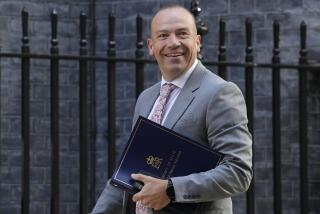Northern Ireland’s largest Protestant militia surrenders weapons
Reporting from London — Northern Ireland’s largest Protestant paramilitary group announced Wednesday that it had finally surrendered all of its weapons, more than a decade after the historic Good Friday Agreement formally ended violent sectarian struggle in the province.
Independent monitors confirmed that the Ulster Defense Assn.’s guns and bombs had been put out of commission, meaning that the main armed organizations on both sides of the loyalist-republican divide have been disarmed.
The step was hailed as a milestone by the British government, which has imposed a Feb. 9 deadline for weapons held by underground groups to be turned in without penalty. After that, those possessing weapons could face criminal prosecution.
“This is a major act of leadership by the UDA and further comprehensive evidence of the success of politics over violence in Northern Ireland,” said Shaun Woodward, the Cabinet minister in charge of Northern Ireland affairs.
The UDA was the last major group to surrender its arsenal, a stash it used to brutal effect during “the Troubles.”
The organization, dedicated to preserving British rule over Northern Ireland, once claimed a membership of thousands and is believed to be responsible for more than 400 killings, mostly of Roman Catholics, including eight civilians who were gunned down at a countryside pub in 1993.
Republicans want the province to unite with Ireland.
At a news conference in Belfast, the capital of Northern Ireland, Frankie Gallagher of the UDA’s political wing expressed regret for the organization’s contribution to the bloodshed of decades past.
“There’s not much we can do about the past,” Gallagher said. “What we can do is ensure . . . the future ahead is here for our young people to prosper and live in peace and harmony and we don’t repeat the tragedy of the last 40 years.”
Although the 1998 Good Friday power-sharing accord envisaged that the main armed groups would relinquish their weapons within two years, none met that goal. The UDA vowed to maintain some weapons as long as it deemed splinter republican groups to be a threat.
Such groups continue to operate. Authorities blame them for the killings of two British soldiers and a police constable early last year and for a 400-pound bomb found in a car outside Northern Ireland’s police commission office in November. That month, independent observers put the threat level from republican rebels at its highest in almost six years.
Disaffected loyalists also continue to resort to violence, including the beating death of a Catholic community worker last May.
But with the government’s weapons amnesty due to expire, UDA leaders apparently decided to go through with disarmament despite the sporadic outbreaks of conflict.
“The road to decommissioning has not been easy,” Woodward said. “It has required people keep faith with demanding and exacting policy, supported by clear principles built on a total rejection of violence.”
Since the end of armed conflict, many former UDA members have turned to other illegal and potentially violent activities such as smuggling, drug dealing and organized crime, officials say.
More to Read
Sign up for Essential California
The most important California stories and recommendations in your inbox every morning.
You may occasionally receive promotional content from the Los Angeles Times.











